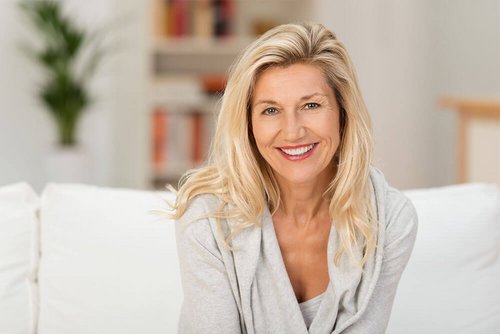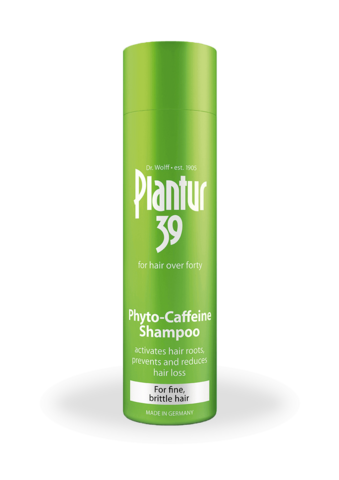Hair loss during menopause - an unpleasant symptom
As a woman in the menopause, also known as the climacteric or the change, you really don’t have it easy. Hot flushes, mood swings and fitful sleep are just a few of the typical symptoms which you are quite possibly suffering from. And on top of all that: hair loss.
Be assured - you are not alone! Almost one in three women struggles with this burden during the menopause. But there is some news that will bring hope: you can do something about hormone-related hair loss!

Hair loss and the menopause: when oestrogen deficiency is the cause.
Oestrogens are female hormones, which influence your cycle for example, and play a big role during pregnancy. But they also boost hair growth, making your hair lovely and thick.
During the menopause, however, the body shuts down the production of oestrogen. A frequent consequence is hormone-related hair loss. On the one hand, this is because the growth phase of the hairs is cut short by the oestrogen deficiency. The hair root is no longer supplied with nutrients as well as before. Hair growth slows down and the hairs become thinner.
On the other hand, the body's own male hormone testosterone gains influence because it is no longer being suppressed by its female counterpart, oestrogen. If there is also a genetic predisposition, the conditions for hair loss during the menopause are perfect.
Menopausal hair loss and its psychological consequences
Many women suffer greatly when they see that their hair is getting thinner. Hair loss is often associated with a loss of self-esteem. Thick hair is generally deemed to be the beauty ideal. Apart from this, the menopause is already a stage of life that is often felt to be especially demanding and stressful. It is important that you don’t let yourself be dragged down too much. Hair loss is usually attributable to harmless causes and can normally be at least slowed down if not totally stopped. Try to stay calm. After all, psychological stress is everything but helpful in your situation as it can often be another trigger for hair loss.
Shedding hair: symptom of the menopause or other causes?
Hair loss can have lots of different causes. In order to treat the problem effectively, it is important to find out what the trigger is.
Everyone loses up to 100 hairs a day and this is quite normal. If a few hairs fall out when you are brushing or blow drying it, then you have no reason to worry. The hairs on your head are all at different phases and as the lifespan of a hair is limited to a few years, it is going to fall out at some point. On average, up to 100 hairs happen to reach this stage every day.
You should take a closer look if you’re losing a lot more than this every day. Perhaps you’ve noticed that your hair has become thinner and duller when you look in the mirror. Or you are finding more hairs on your pillow or in the shower drain than before. Then you should get to the bottom of it. If you are already in the menopause, this could be the reason. But there are lots of other triggers for hair loss.
Other possible causes of hair loss:
- An underestimated factor for hair loss is stress. Lots of people only associate this with negative pressure, but stress can also be positive. If you’re speeding from one appointment to another, it might be that various bodily functions are suffering, although you believe you’re fine. Treat yourself to regular breaks and rest!
- An unbalanced diet can be the reason for hair loss. Trace elements and vitamins are important for thick and healthy hair. So make sure you are eating a balanced diet.
- Iron deficiency or Vitamin D deficiency are common causes of hair loss. Talk it through with your doctor. They can check your levels and tell you what you can do. Vitamin deficiencies or other key nutrient deficiencies can often be remedied just by changing your diet or by taking supplements.
- Thyroid deficiency can often be the reason for hair loss too. If you also have symptoms such as tiredness or a lack of motivation, you should tell your doctor. In most cases, the hormone deficiency can be offset by tablets.
How do I recognise menopausal hair loss?
The change to your hormonal balance is responsible for it. If you are not sure if you have already reached the menopause, look for possible symptoms like insomnia, sudden hot flushes, lack of motivation and mood swings. These can all frequently occur during the menopause. Also the monthly cycle becomes more irregular. Added to this is hair loss for some women. You are most likely to notice it when you look in mirror because your hair will be less thick, which means your scalp may shine through more clearly. You can see this mostly in the area around your parting. To make sure you don’t get any bald patches, you need to act as well as look.
What can I do if my hair is falling out during the menopause? Caffeine helps!

If the menopause is still ahead of you, you can do something about it now to prevent hormone-related hair loss. There are several options: hair care products that contain caffeine are especially effective. It is not just your spirits that get a boost from consuming the stimulant, but also your hair!
This is because caffeine activates the hair root, stimulating hair growth. To be successful, you should apply a caffeine shampoo to your hair daily for at least two minutes.
The daily uptake of caffeine is also possible even if you don’t wash your hair every day. Then a suitable tonic is recommended, which you simply apply to the dry hairline and gently massage in. No need to rinse! Caffeine supports hair growth even when you have noticed the first signs of menopausal hair loss.
Plantur 39 – for thinning hair
What else can help prevent hair loss in the menopause?
- The hair root needs vitamins and trace elements such as iron and zinc for strong and healthy hair growth. A healthy, balanced diet is therefore essential for strong hair.
- There are care products for your hair, which contain key vital substances and trace elements such as biotin, selenium and zinc as well as energising caffeine. Daily use is important.
- Avoid stress! Lots of appointments or psychological pressure have a negative effect on your body. Therefore, take enough time to relax in between so you can get some peace for your body and mind.
- Blood circulation to your scalp is also important for healthy hair growth. To stimulate it, treat yourself to an occasional scalp massage. An excellent time to do this is in the shower when you can massage your shampoo in really thoroughly. Besides which, a scalp massage can be relaxing and reduce stress!
- Sport can also help: Regular physical activity doesn’t just boost our metabolism and immune system, it can also help to relieve stress.
Seek a doctor’s advice if you’re unsure about hair loss
If you are not sure whether the menopause is responsible for your hair loss, it's best to go and see a doctor. They will help you look for the causes and can show you the best options for treatment. In some cases, the description of your personal circumstances will be enough for an initial suspicion. A blood test will suggest in the meantime whether you have a vitamin deficiency or physical disorder. The key thing is: don’t worry too much about it. In most cases, there is a simple solution for your situation.




